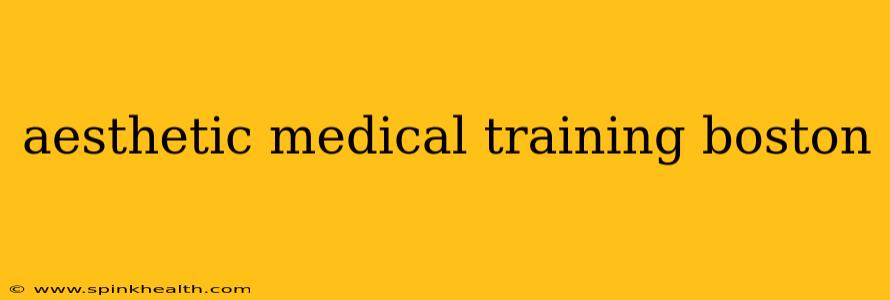Boston, a city brimming with intellectual energy and cutting-edge medical advancements, naturally stands as a prime location for those seeking aesthetic medical training. But navigating the options can feel like traversing a labyrinth of choices. This isn't just about learning procedures; it's about mastering an art, understanding the science, and developing the ethical compass to guide your practice. This guide will illuminate the path, revealing what to expect from aesthetic medical training in Boston and answering your most pressing questions.
What are the different types of aesthetic medical training available in Boston?
The beauty of Boston’s aesthetic medical training landscape lies in its diversity. You'll find programs catering to various experience levels, from introductory courses for medical professionals looking to expand their skillset to advanced fellowships for seasoned practitioners seeking specialization. The options include:
- Certification Courses: These shorter programs focus on specific procedures like Botox injections, dermal fillers, or laser treatments. They're ideal for quick skill acquisition and are often offered by medical device companies or private training institutions.
- Diploma Programs: These are more comprehensive, offering a broader range of aesthetic procedures and often including business aspects of running a practice.
- Fellowships: These are intensive, long-term programs designed for physicians seeking advanced training and specialization in aesthetic medicine. They often involve hands-on experience in a clinical setting.
What kind of qualifications do I need for aesthetic medical training in Boston?
The prerequisites for aesthetic medical training vary greatly depending on the program's intensity and focus. Generally, a medical license or other relevant healthcare professional license (for example, for nurses or physician assistants) is essential. Some programs may require prior experience in a related field, while others might cater specifically to medical professionals with limited or no previous exposure to aesthetic medicine. Thoroughly reviewing the admission requirements of each institution is crucial.
How much does aesthetic medical training in Boston cost?
The cost of aesthetic medical training in Boston is highly variable, influenced by the program's length, intensity, and the specific procedures covered. Short certification courses may cost a few thousand dollars, while extensive fellowship programs can run into tens of thousands. It's wise to explore financing options and thoroughly compare the value proposition of different programs. Consider not just the upfront costs but also the potential return on investment based on the procedures you'll be able to perform after graduation.
Are there any reputable aesthetic medical training institutions in Boston?
Boston houses numerous renowned medical institutions and private training centers known for their high standards of aesthetic medical education. While I cannot recommend specific institutions directly, researching and comparing accredited institutions is essential. Look for programs that boast experienced instructors, high student-to-instructor ratios for personalized attention, and a commitment to ethical practices. Check for accreditation from reputable organizations and read reviews from past participants.
What are the career opportunities after completing aesthetic medical training in Boston?
Completing aesthetic medical training in Boston opens doors to various fulfilling career paths. You can join an established medical spa or clinic, set up your own practice, or work as a consultant for other medical professionals. The demand for skilled aesthetic medical practitioners is consistently high, particularly in a vibrant city like Boston. The earning potential is substantial, though it's dependent on factors such as experience, location, and the types of services offered.
What is the job outlook for aesthetic medical professionals in Boston?
Boston’s robust medical sector and its affluent population create a strong demand for aesthetic medical professionals. The aging population and the growing emphasis on wellness further fuel this demand. While specific job outlook figures change regularly, the field generally shows strong growth prospects for those with the necessary skills and training.
How can I find the best aesthetic medical training program for me in Boston?
Finding the right program requires a thorough research process. Start by defining your career goals, considering your current qualifications and experience. Then, research accredited institutions and compare their curriculum, instructors, and costs. Look for programs that align with your learning style and career aspirations. Attend information sessions if possible, and talk to current students or alumni to gather firsthand insights. Remember, the right program is a significant investment in your future. Choosing wisely will significantly impact your success in this dynamic and rewarding field.

